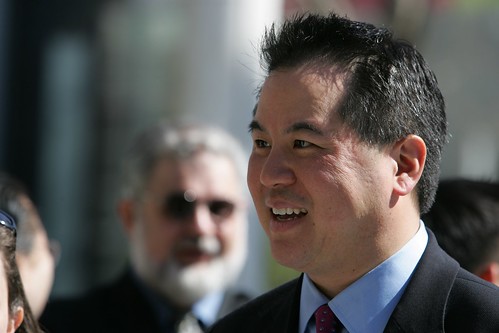When Republicans from around the nation want to really ramp up the rhetoric, they start attacking modern “San Francisco” values. You know, marriage equality, diversity, environmental activism, labor union solidarity and expansion of healthcare.
We expect this kind of anti-San Francisco rhetoric from the likes of Rush Limbaugh and even Mitt Romney and Paul Ryan. But we don’t usually see it in San Francisco itself. That’s why the strange campaign of conservative Michael Breyer is so unusual. He’s running in a district that rests largely in San Francisco while calling to restore what he is calling “traditional” San Francisco values.
This normally wouldn’t even be a topic of serious consideration. But Breyer has already spent more than $600,000 of his own money on a relentlessly negative campaign and is on pace to spend more than twice that. He is also raising funds from conservatives who are leading the attacks against public pensions. And money from large corporate landlords is also flowing into his campaign. So, who is Michael Breyer and what is his problem with modern San Francisco values?
Michael Breyer – Another Conservative from Massachusetts
Breyer was born and raised in Massachusetts where he attended some of the nation’s most elite private schools. He then went to Stanford, where he graduated.
San Francisco is full of transplants from all over the nation and world, so there is nothing wrong with being from Massachusetts. Except Michael Breyer calls himself a “fifth generation San Franciscan.” His campaign literature shows pictures of local icons like Lowell High School. His whole campaign is about San Francisco “tradition.” Except he didn’t go to Lowell High School – and he’s not from San Francisco. Maybe this distance created the political myopia that’s causing him to attack modern San Francisco values, like protecting the environment and promoting children’s health.
After graduation Breyer went into the “family business,” so to speak, launching a company called Courtroom Connect to provide services to the courts, where both his father and uncle are ranking justices. He calls it a “small business” but it is an Atlanta corporation that has both large public contracts with the courts and a range of corporate interests, including big tobacco.
His first public record of serious interest in politics appears to be giving funds to an anti-choice, anti-marriage equality Tennessee politician known for his e-book, “God and Politics,” which Breyer endorsed on the back cover.
Breyer went on to become a part of the flood of so-called “Independent” expenditures around the 2011 San Francisco Mayor’s race. After a review by the Ethics Commission staff, he was actually barred from further participation in the Mayor’s race, although that determination was reversed on appeal.
Why does Michael Breyer think protecting children and the environment is zany?
In one of his first pieces of political literature, he attacked the successful efforts to phase out unwanted Yellow Page distribution, which account for unnecessary environmental waste. This was one of the major legislative efforts from the local Sierra Club last year.
He also attacked the effort to protect the health of children by phasing out the linkage between children’s toys and junk food contributing to childhood obesity and other health challenges.
His early campaign literature also pushed pension reform and said again and again he would be a representative of the “traditional” San Francisco values.
What is Michael Breyer Trying to Say?
We know what San Francisco values are. They are tolerance, diversity and justice. Breyer’s opponent, Phil Ting, is the former executive director of a prominent civil rights organization. Ting has won the support of virtually every single organization to take a stand in the race with the exception of groups representing large corporate landlords.
The race is already highly negative, with Breyer just mailing his fourth hit piece in two weeks. Negative campaigns are nothing new in San Francisco. But a campaign against San Francisco values from a candidate running in San Francisco certainly is.
You can stay up to date on the race at www.MichaelBreyerfacts.com

